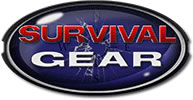The Preparedness Toolbox
When we talk about a "prepper toolbox," we’re not really referring to physical objects but rather skill sets to learn and practice. I've talked before about how all too many preppers have sort of blinders on and become so focused on one aspect they let others fall to the wayside. This happens with food storage, wilderness skills, and perhaps most often with security.

Think of all your preparedness skills as tools, each with different uses. If you focus too much on security, for example, you may end up with a toolbox filled with all sorts of hammers…when what you really need is a slotted screwdriver.
Your toolbox should have an assortment of tools to tackle a wide range of tasks.
Someone well-versed in disaster readiness should know:
–How to start and feed a fire under adverse conditions and with various implements.
–How to properly store food long-term.
–How to purify water using a wide range of techniques.
–How to keep their family safe and secure.
–How to improvise and think outside the box.
–How to build an expedient shelter using whatever materials might be at hand.
–How to turn off the gas and water in their home.
–How to put out a fire that is getting out of control.
–How to provide basic first aid, at a minimum.
–How to identify several different edible and otherwise useful plants.
The list goes on and on.
Robert Heinlein, in Time Enough for Love, wrote:
"A human being should be able to change a diaper, plan an invasion, butcher a hog, conn (steer) a ship, design a building, write a sonnet, balance accounts, build a wall, set a bone, comfort the dying, take orders, give orders, cooperate, act alone, solve equations, analyze a new problem, pitch manure, program a computer, cook a tasty meal, fight efficiently, die gallantly. Specialization is for insects."
Once upon a time, many of the skills we consider related to disaster readiness were really just commonplace. Few people DIDN’T know how to light a fire and cook over it. In our modern society, with all our technological conveniences, we often take these sorts of things for granted. If we’re hungry, we just pop something in the microwave and, voila, we’re ready to chow down. But, what if the power is out and that nuke machine is nothing more than a heavy box?
Make a commitment to yourself today to learn a new skill. Pick something you’ve always wanted to learn but just never got around to doing. Do your research, find a teacher if necessary, and then practice, practice, practice until you get it right.
Always look for ways to add to your toolbox!
